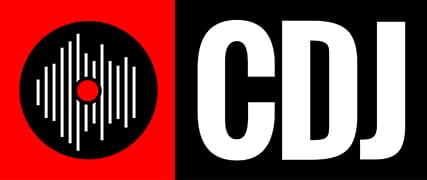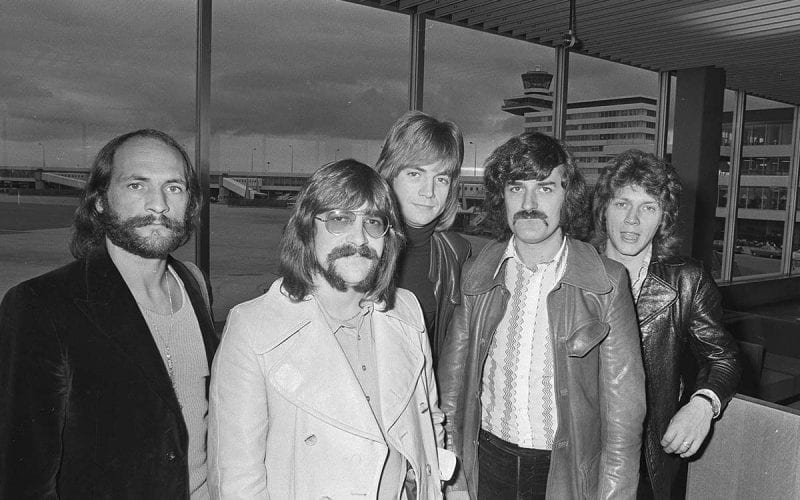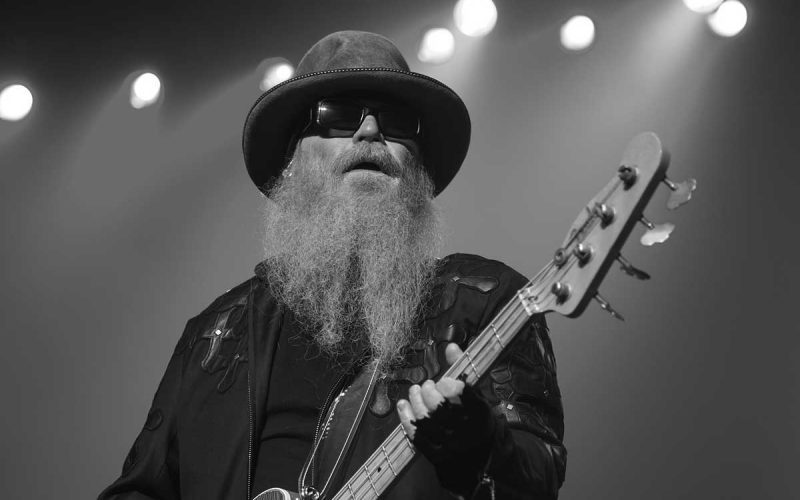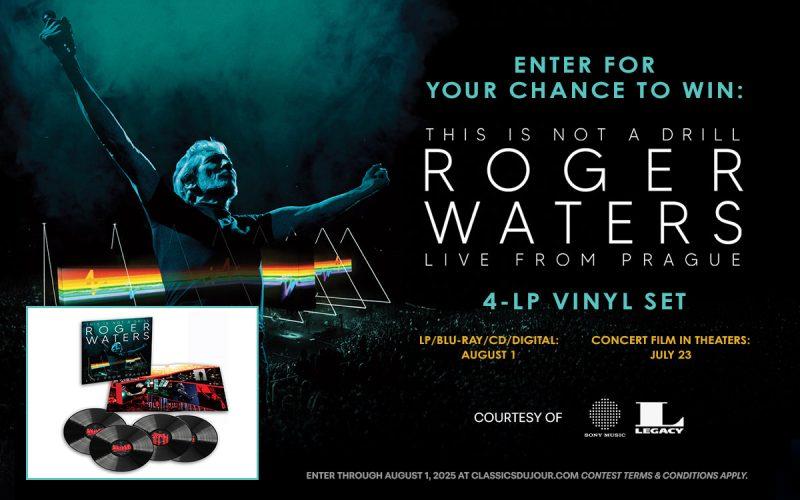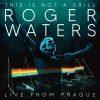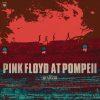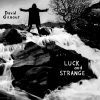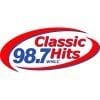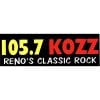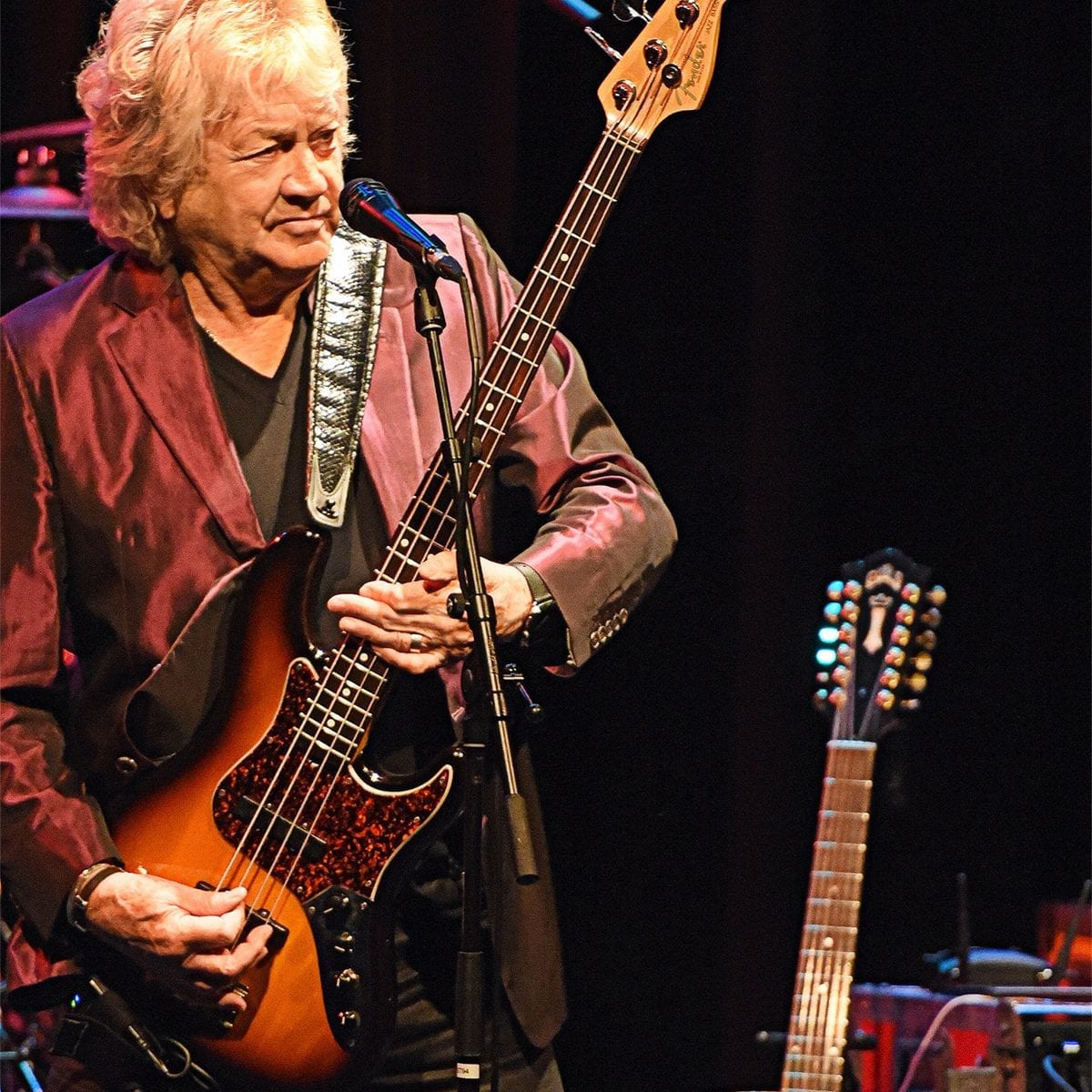
“I think prog rock were bands like The Moody Blues who wanted to explore something totally different, but use music to portray who they were, and not what a songwriter had written a song about. We understood a lot of classical music but didn’t want to play classical music. We explored things that no one else had ever thought about doing. I think that’s what progressive rock is.”
John Lodge isn’t just a prog rock pioneer and a singer in a rock and roll band that was recently inducted into the Rock and Roll Hall of Fame. He is also the songwriter who penned many of The Moody Blues‘ biggest and most-beloved songs, including “I’m Just a Singer (In a Rock and Roll Band),” “Isn’t Life Strange,” “Ride My See-Saw,” “Gemini Dream” and “Procession,” just to name a few. As the band’s bass player, Lodge is the keeper of the beat, and according to Bass Player magazine, one of the top ten bassists of all time.
I recently spoke with Lodge about life – strange or otherwise – his early days in Birmingham, England, his solo 10,000 Light Years Band, their upcoming participation on the Rock & Romance Cruise, their North American tour with Yes, Asia and Carl Palmer, and good and bad days, both future and passed.
You are ready to pack your bags and set sail with your 10,000 Light Years Band on the Rock and Romance Cruise, which leaves Miami February 15th through the 22nd. Tell us who’s in the band and what they play.
Okay, well my musical director/keyboard player is Alan Hewitt, and he was with me with The Moody Blues for like ten years. Alan and I have worked very closely together over all those years. On drums we’ve got a drummer called Billy Ashbaugh. Billy actually came in as second drummer over the last few years with The Moody Blues as well. You know, a bass player and a drummer – you need the right drummer and Billy is the perfect drummer for me. On guitar I’ve got Duffy King, who is from Detroit. And I have a cellist, Jason Charboneau, and he’s also from Detroit.
Detroit, of course, home of Motown. You can’t get much better than that.
Yeah, it is. You don’t get better than that. I mean, I’m from Birmingham and Birmingham was called (the) second Motor City. Detroit, of course, being first Motor City, so that all worked really well for me.
Yes. And thank you for anticipating my next question, which was going to be – of course the band name comes from your 2015 solo album 10,000 Light Years Ago. And John, I have long wanted to ask you about the biographical song “Those Days in Birmingham.” All these years later, has your view of those days changed at all?
No. I mean, those days in Birmingham, that’s what it was all about for me. You know I grew up listening to American music, American rock and roll, on jukeboxes. (I) put the coin in the slot and listened to Gene Vincent, Jerry Lee Lewis, Fats Domino, Little Richard. All my rock and roll type of heroes. And listening to the 12-inch speakers on those jukeboxes belting out the beat. The backbeat, the rhythm from the bass part. And that’s what I fell in love with.
I understand you’ll be performing songs from this solo album on the upcoming cruise. Will they include, in fact, “Birmingham” and possibly “Simply Magic,” which of course features the – sadly – late Moody Blues member Ray Thomas on flute?
I never quite make up my mind until I’m really focused on the tour and when I’m gonna be performing. I think when you write your own songs you do have a great selection of songs you can choose to put a concert together that you think is the right songs for that tour.
The list of hits that you’ve written and recorded for The Moody Blues, and of course your solo projects, is probably as long as the ship is from stem to stern (laughs)! Can you give fans maybe an idea of what classic songs they can certainly expect to hear?
When I’m doing the full show, obviously “I’m Just a Singer (In a Rock and Roll Band)” and “Ride My See-Saw” and “Isn’t Life Strange.” But it gives me an opportunity to do songs that I’ve never done in The Moody Blues. Songs like “Candle of Life, Saved by the Music.” And also – you know you mentioned Ray earlier – it’s very sad that Ray’s not here, but I want to keep his music alive, and I perform a song called “Legend of a Mind,” which for me sums up Ray completely.
I should mention that the cruise also includes performances by Cheap Trick, America, Don Felder, Randy Bachman, Todd Rundgren, Jefferson Starship, among many, many, many others. Do you know how many sets you play on the cruise?
I’ll be doing two sets and I think I’m gonna do a sort of question and answer, but I’m not too sure about that. But you know, I have my own little wine company (Krisemma Wine) and so sometimes I like to do a wine and music event that’s sorta more acoustic in the evening, and just a more informal part of the cruise. The fans seem to enjoy that, you know, so maybe I’ll do that as well.
In preparing for our conversation this morning I, of course, went back and listened to plenty of music and it occurred to me that the line in the first verse of “Isn’t Life Strange” that says, “The sea will not wait,” will be particularly significant – I think – on the high seas. And also, another line, “Wish I could be in your heart/to be one with your love” should also hit home to many on the Rock and Romance part of the cruise. Would you agree?
Yeah (laughs)! That’s a great analogy. Well done, Jim! I hadn’t thought about that, but yeah, that could be the title of the cruise.
There you go (laughs)! In addition to the cruise, you guys are also going to join Yes, Asia and Carl Palmer for the North American Royal Affair Tour. Now that’s a great name for that tour. That starts June 12th and runs through July 28th, according to the dates I have. I’m sure you’ve logged many miles and shared countless stages with these guys. True?
Yeah, it is, and Yes and The Moody Blues, we came up together. And of course, Carl Palmer and myself, we’re both from Birmingham in England and we just worked together in Birmingham about four weeks ago because we were both honored with a Walk of Fame star on the main streets in Birmingham. So, that was something special for Carl and I. And we’ll be on the road together during the summer across America. I’m really looking forward to it.
Belated congratulations on that great honor, and also, I’ll take the opportunity to give you a belated congrats of course into the induction into The Rock and Roll Hall of Fame. About a 55-year ride to get into that hallowed hall, huh.
Yeah, I’ve come a long way in rock and roll and touring and everything. It’s just exciting, and my adage is, have bass, will travel.
That’s great. Just two more questions for you, John, and again thank you so much for your time. I appreciate it. I was gonna ask you about prog rock, progressive rock. What is your definition of prog rock?
For me, what it meant was that you had top 40 radio, and top 40 songs. The two-and-a-half minute songs. You know, bubble gum music, or whatever it was called in those days, which were played non-stop on top 40 AM radio. And I think prog rock were bands like The Moody Blues who wanted to explore something totally different, but use music to portray who they were, and not what a songwriter had written a song about. And I think that’s what we did. Up until then, bands like The Moody Blues were playing a lot of American blues music or American rock and roll music. And that comes from the heartland of America, and we were thinking, perhaps we should do the heartland of England, you know. I’m from Birmingham, let’s write about us growing up and what our thoughts were and our dreams and whatever. And I think that’s where the music came from. We understood a lot of classical music, but didn’t want to play classical music, but understood what it was about. It’s about achieving something that no one else has done. I think that’s what we did with our prog rock. We explored things that no one else would have ever thought about doing, you know. I think that’s what progressive rock is. Just exploring things that no one would have ever thought about. And it gave you your own stamp. The Moody Blues are totally different to Yes, totally different to ELP, totally different to Pink Floyd, totally different to Led Zeppelin. But we all traveled this road which was not AM top 40 radio.
That is a fantastic definition of a wonderful genre, for sure. Let me close with a question that I often ask in these conversations, John, and that is what I call the proverbial – and sometimes literal – Beatles on Ed Sullivan moment. By that I mean, did a song come on the radio, did you hear an album, did you go to a concert or something where, following that, you said to yourself, this is what I have to do with my life and for the rest of my life?
Yeah. Buddy Holly. “That’ll be the Day.” I heard that record, (and) for me, “That’ll be the Day” is one of the first prog rock records. That was a big hit in the U.K. I don’t know whether it was a big hit in America. It wasn’t a 12-bar. And it wasn’t a normal A with a minor chord in there to make it like a love song. It actually started in a different chord to what the key of the song was. And, it took me by surprise, and it put me on that rocket ship to where I’ve gotten to today. Well, let me just tell you, Jim, just for the information: I bought that record on a 78(rpm), and I’ve got a 1945 10-15 jukebox, and that record is still on that jukebox and it still plays unbelievably well.
That sounds so great. Thank you so much for this…
Okay, Jim.
…is there anything else that I haven’t brought up or anything else that we need to cover before we say goodbye?
Well, I’m actually gonna be releasing a sort of a catch-up album of some songs from my first album Natural Avenue, songs from 10,000 Light Years Ago, and songs from the Live from Birmingham album, and a new song called “Street Café.” That’s gonna be released in the next few weeks. If you mention that it’d be great. It’d be wonderful.
Absolutely. And certainly, thank you for that. I will certainly do that. It’s such a pleasure, John. Thank you very much for your time, and hopefully we’ll get a chance to say hello face-to-face again sometime soon.
Okay, Jim. If you come around, come and see me and say hi.
Absolutely! Would love that. Thank you. Bye-bye.
Thank you for the interview. Cheers.
